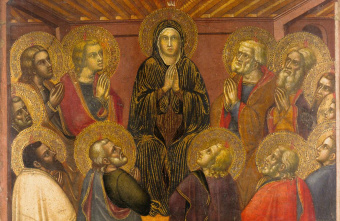The history of the early Christian church begins with it considered to be a sect of the Jews. Judaism, at the time of Jesus Christ, was a collection of several competing religious powers.
After the ascension of Jesus, and the start of the church on Pentecost, the apostles and early believers continued operating with Judaism. The first Christians were later labeled a Jewish sect (Acts 24, see also chapter 28).
Early first century believers continued, as they always did, to worship at the temple or to gather at a local synagogue. They did so, however, as they preached the gospel. The good news of God's kingdom brought by Jesus soon found its way to those who were not Jewish (e.g. Gentiles). History states that the pace of truth spreading from the church increased rapidly (Acts 14:1, see also 17:1 - 4).
Soon a new debate entered the church. Did a Gentile need to be circumcised before they became a Christian? What is known as the Jerusalem conference was held to debate and decide the matter. It was ultimately decided, among other things, that Gentiles did not have to undergo the painful rite of circumcision in order to be saved.

Both the apostle Paul and the other apostles agreed over what was God's will for the Gentiles. Several years later Paul had to affirm his God-inspired teachings to the Gentiles (Acts 21:21 - 26). Believers, soon after the Roman empire destroyed the city of Jerusalem in 70 A.D., came back to rebuild it. The church in the city remained under the direction of Jews who had been converted. All was peaceful among Christians until early in the second century.
During the Jewish led Bar Kochba revolt in 135 A.D. leaders of the uprising began to persecute Jews who had converted and became a Christian. Soon after the revolt all racial Jews were forbidden, by the Romans, to live in Jerusalem. This left believers in the city governed by Gentile converts.
Around this same time Jewish believers in Jesus began to be branded as heretics. Without the presence of Jews who had converted to being a Christian, the Jerusalem church began to weaken doctrinally.
History tells us that by the 2nd century Christians in large cities were independently ruled not by a collection of elders (like the churches that existed in the days of Paul and Peter) but by a local bishop. Although all believers were not ruled by a single bishop, most held the church in Rome in high esteem due to wealth, size and association with the apostles Paul and Peter.
Without the spiritual guidance of Jerusalem's early Jewish Christians, changes in doctrine began to emerge - especially among places outside of Judea. Vague references to observing the "Lord's Day" of rest on the first day of the week, instead of on the seventh day, began to emerge.
Soon, seventh day Sabbath keeping began to be condemned. By 150 A.D. some were zealously promoting the idea that the day of sun worship, or SUNday, was THE day a Christian should rest on and worship God.
Plagued by those who claimed they represented the 'true' teachings of Jesus, bishops from several large cities sought to solve this dilemma by arriving at a universal (catholic) set of beliefs. Although it took many years to debate different issues and arrive at some consensus, what came out was a 'catholic' church which had a single set of beliefs and which had consolidated its power.
The final consolidation of Catholic power came after Constantine ended Rome's state-sponsored persecution of Christians in 313. Sunday became the official day of rest, by Roman decree, in 321.
In 380, Roman Catholicism was made the official state religion of the Roman Empire. The worship of Jesus' mother Mary, angels, saints, and so on began to arise during the 4th century as pagan converts continued to hold on to many of the false doctrines they believed before coming to the church.
Jude urges believers to contend for the faith delivered to the early church and to be on guard against those who wish to preach false doctrine (Jude 3 - 4). After Jerusalem's Christians scattered the church, as a whole, began to split and schism. Over time some who labeled themselves 'catholic' or universal came together and agreed to a set of doctrinal beliefs. These beliefs, however, were not the same ones taught by the early apostles and disciples.
Today, many believers maintain a set of beliefs that are, to a lesser or greater degree, nothing more than myths and teachings promulgated by those who were not guided by God's spirit.
What people learn in the 21st century is, in large part, not the same teachings as taught in the early history of the Christian church. Some believers even admit that some of the things they do and practice, such as worshipping God on Christmas and Easter, have their entire basis in paganism. Does God want this? What will you do know that you know the truth?